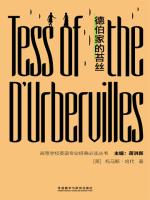TESS
Hardy's writing often explores what he called the "ache of modernism", and this theme is notable in Tess, which as one critic noted, [5] portrays "the energy of traditional ways and the strength of the forces that are destroying them". In depicting this Hardy uses imagery associated with hell when describing modern farm machinery, as well as suggesting the effete nature of city life as the milk sent there must be watered down because townspeople cannot stomach whole milk. Angel's middle-class fastidiousness makes him reject Tess, a woman whom Hardy presents as a sort of Wessex Eve , in harmony with the natural world. When he parts from her and goes to Brazil , the handsome young man gets so ill that he is reduced to a "mere yellow skeleton". All these instances have been interpreted as signs of the negative results of humanity's separation from nature, both in creating destructive machinery and in failing to rejoice in pure and unadulterated nature。
On the other hand, Marxist critic Raymond Williams in The English Novel from Dickens to Lawrencequestions the identification of Tess with a peasantry destroyed by industrialization . Williams sees Tess not as a peasant, but as an educated member of the rural working class, who suffers a tragedy through being thwarted in her aspirations to rise socially and her desire for a good life (which includes love and sex), not by industrialism, but by the landed bourgeoisie (Alec), liberal idealism (Angel) and Christian moralism in her family's village (see Chapter LI). Earlier commentators were not always appreciative. Henry James and Robert Louis Stevenson in Bournemouth "loved to talk of books and bookmen: Stevenson, unlike James, was an admirer of Thomas Hardy, but agreed that Tess of the D'Urbervilles was 'vile'."
Another role of Tess's only true friend and advocate, pointedly subtitling the book "a pure woman faithfully presented" and prefacing it with Shakespeare 's words from The Two Gentlemen of Verona : "Poor wounded name! My bosom as a bed/Shall lodge thee." However, although Hardy clearly means to criticize Victorian notions of female purity, the double standard also makes the heroine's tragedy possible, and thus serves as a mechanism of Tess's broader fate. Hardy variously hints that Tess must suffer either to atone for the misdeeds of her ancestors, or to provide temporary amusement for the gods, or because she possesses some small but lethal character flaw inherited from her ancestors.
Because of the numerous pagan and neo- Biblical references made about her, Tess has been viewed variously as an Earth goddess or as a sacrificial victim. For example, early in the novel, she participates in a festival for Ceres , the goddess of the harvest, and when she baptises her dead child she chooses a passage from Genesis , the book of creation, rather than the more traditional New Testament verses. Then when Tess and Angel come to Stonehenge , which was commonly believed in Hardy's time to be a pagan temple, she willingly lies on a stone supposedly associated with human sacrifice .
Tess has been seen as a personification of nature, an idea supported by her association with animals throughout the novel. Tess's misfortunes begin when she falls asleep while driving Prince to market and causes the horse's death; at Trantridge, she becomes a poultry-keeper; she and Angel fall in love amid cows in the fertile Froom valley; and on the road to Flintcomb-Ash, she kills some wounded pheasants to end their suffering.
Yet Tess emerges as a powerful character not through this symbolism but because "Hardy's feelings for her were strong, perhaps stronger than for any of his other invented personages".
When he was 16 years old, Hardy saw the hanging of Elizabeth Martha Brown , who had murdered a violent husband. This fascinating, yet repellent experience contributed to the writing of Tess.
The moral commentary running through the novel insists that Tess is not at fault in imposing mythological, biblical and folk imagery over a story of a young girl seduced and abandoned to create a "challenging contemporaneity". It was controversial and polarizing, setting these elements within a context of 19th-century English society, including disputes within the Church, the National School movement, and the overall class structure of English society and changing circumstances of rural labour. During the era of first-wave feminism , civil divorce was introduced and campaigns were waged against child prostitution, moving gender and sexuality issues to the forefront of public discussion. Hardy's work was criticized as vulgar, though by the late 19th century other experimental fiction works were released such as Florence Dixie 's depiction of feminist utopia , The Story of an African Farm by Olive Schreiner , and Sarah Grand 's work The Heavenly Twins, raising awareness about syphilis and advocating sensitivity rather than condemnation for young women infected with the disease.




 京公网安备 11010802032529号
京公网安备 11010802032529号